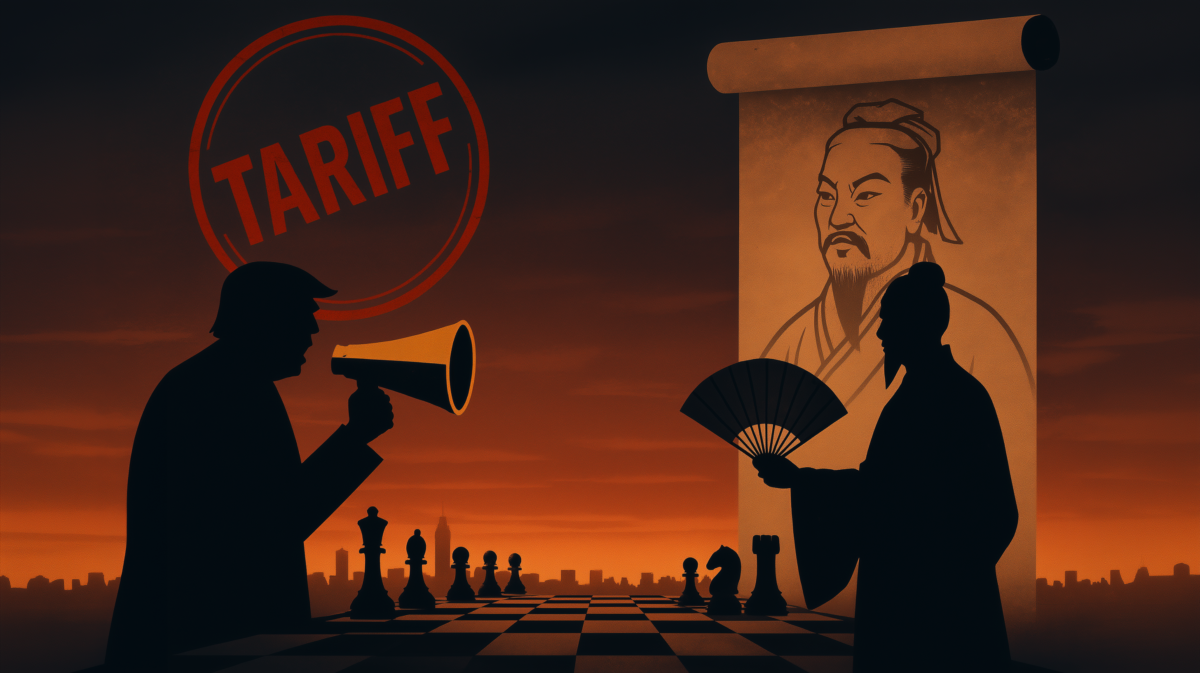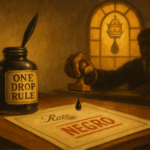Sun Tzu whispers across twenty-five centuries: “Appear weak when you are strong, and strong when you are weak.”
Miyamoto Musashi nods from the edge of a tatami mat: “Generally speaking, the Way of the warrior is resolute acceptance of death.”
I. When the loudest man in the room meets the oldest playbook
Donald Trump has always sold volume—tower-high letters, gold-leaf elevators, splashy debt. The show worked often enough in the Atlantic City days that even after four corporate bankruptcies and a moment when bankers put him on a monthly allowance just to keep the lights on, the brand survived.
It is a sales style born on Manhattan sidewalks: intimidate the subcontractor, charm the tabloid, move on before the numbers are due.
But 2025 was not a sidewalk. It was a $24-trillion chessboard with China sitting stone-faced—behind pieces carved over two millennia of strategic literature. When Trump re-entered the White House he raised the stakes to a headline 145 % blanket tariff on Chinese goods, crowning April 2, “Liberation Day.”
Markets sagged, the dollar drifted, the International Monetary Fund shaved half a point from world growth, and Beijing… barely flinched.
II. Beijing’s Sun Tzu moment
Rather than match noise for noise, China answered with 125 % counter-tariffs trained on soybeans, bourbon, and Midwest semiconductors—the pressure points of an American election map.
Outwardly, officials spoke of “regrettable escalation,” a pose of vulnerability straight from The Art of War. In practice, they rerouted orders through ASEAN, juiced domestic chip incentives, and invited BRICS partners to pilot an alternative payment rail. The strategy was not to win headlines; it was to lengthen the contest until U.S. lobbyists, farmers, and fund managers begged for release.
That is shi: shaping the strategic landscape so the enemy defeats himself. Sun Tzu would have smiled at the elegance.
III. Musashi’s steel underneath—fearlessness in loss
Behind the bureaucracy, Beijing embraced something closer to Musashi’s “resolute acceptance of death.” It publicly priced in short-run pain—higher import prices, lost U.S. orders—as the tuition for long-term autonomy. When a nation signals it can outlast the storm, the storm loses leverage. Trump’s bluff relied on the opposite illusion: convince markets no storm will touch him.
IV. The retreat
By late April, the fallout arrived in phone-bank form. Retail CEOs, farm lobbies, and the semiconductor caucus called every West Wing extension available. The Dow shed twelve percent in nine trading days; the dollar index slid to lows unseen since the first COVID summer. Then, on April 23rd, the president told reporters tariffs on China would “not be anywhere near 145 %” once “a good deal” was struck.
That single-sentence pivot—uncorroborated by any concession from Beijing—was the moment Wall Street christened the blink.
Gulf stock markets bounced, U.S. futures rallied, and analysts wrote the first obituaries for the “Liberation Day” doctrine.
V. Why the bully lost his footing
- Mirror-imaging. Trump assumed everyone fears quarterly numbers the way American CEOs do. Chinese planners fear the verdict of history books, not next Monday’s sell-side call.
- Time horizons. An election cycle is two years of working time; China’s Five-Year Plan is five.
- Credibility of pain. Trump, the self-styled deal-maker, has survived serial corporate collapse with other people’s money. Beijing remembered—and waited.
- Cultural fluency. A man who once joked that he “read The Art of the Deal, not The Art of War” underestimated how deeply the latter is engraved in East-Asian statecraft.
VI. Lessons for anyone who faces loud power
From a Pan-African vantage, where memories of colonial extraction still pulse beneath modern headlines, the episode offers a quiet tutorial:
- Volume is not strength. True leverage is positional, not vocal.
- Patience can be weaponized. The side willing to absorb short-term discomfort dictates the calendar.
- Narrative is armor. Beijing cast itself as a defender of sovereignty; Washington looked like an aggressor reneging under pressure. Stories move capital as surely as yield curves.
VII. Coda
Trump’s tariff blitz was less a strategy than a reflex—an echo of casino days when bluster might scare lenders into new credit lines. This time the pit boss across the table quoted Sun Tzu and carried a memory older than the United States itself. The result was inevitable: the player who never learned to fold met an opponent who never needed to raise his voice.
And so the curtain falls on “Liberation Day,” a Potemkin victory dissolved in a single press gaggle. Somewhere in the void between Atlantic City and Xiangyang, Musashi’s ghost sharpens a blade and reminds us: mastery begins the moment you cease fearing loss.








Add your first comment to this post